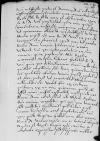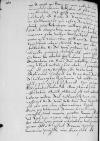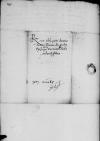List #2606
Stanisław HOZJUSZ (HOSIUS) do Ioannes DANTISCUSCracow (Kraków), 1542-12-04
| odebrano Heilsberg (Lidzbark), 1542-12-16 Rękopiśmienne podstawy źródłowe:
Publikacje:
| ||||||
Tekst + aparat krytyczny + komentarz Zwykły tekst Tekst + komentarz Tekst + aparat krytyczny
Reverendissimo in Christo Patri Domino, domino
Reverendissime in Christo Pater et Domine, domine colendissime.
Officiosissimam servitutis meae commendationem.
Recte sibi de fide mea et observantia erga se Reverendissima Dominatio Vestra persuadet: quae cum quasi hereditaria mihi sit, numquam committam, ut opinionem illius de me fefellisse videar. Quae misit ad me Reverendissima Dominatio Vestra, ea per id tempus ita fuerunt apud me, ut praeter reverendissimum  BCz 1618, p. 468 agi de censu quodam, qui cum ecclesiis sive ministris earum debeatur, ab istis non persolvitur. “At quid ea res”, inquam, “pertinet ad reverendissimum dominum Varmiensem, cum in
BCz 1618, p. 468 agi de censu quodam, qui cum ecclesiis sive ministris earum debeatur, ab istis non persolvitur. “At quid ea res”, inquam, “pertinet ad reverendissimum dominum Varmiensem, cum in
Haec ego ideo scribenda Reverendissimae Dominationi Vestrae putavi, ut quod aliunde quoque fortasse scit, quis esset  BCz 1618, p. 469 contributionem solvendam, quae in synodis fuerit decreta. Plura Reverendissimae Dominationi Vestrae scribam per cubicularium.
BCz 1618, p. 469 contributionem solvendam, quae in synodis fuerit decreta. Plura Reverendissimae Dominationi Vestrae scribam per cubicularium.
Deum precor, ut illam diu servet incolumem et felicem. Cuius me gratiae commendo.
Eiusdem Reverendissimae Dominationis Vestrae servitor deditissimus
Postscript:
S(erenissima) or S(acra)⌈S(erenissima)S(erenissima) or S(acra)⌉



